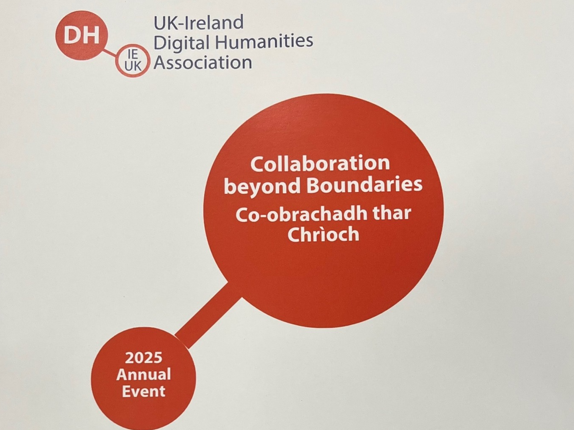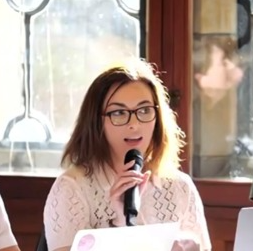Collaborating Beyond Boundaries: VOICES at the UK–Ireland Digital Humanities Association Annual Event
By Dr Bronagh Ann McShane
Last month, I had the privilege of representing the VOICES project at the annual conference
of the UK–Ireland Digital Humanities Association, hosted by the University of Glasgow. The
theme of this year’s event, Collaboration Beyond Boundaries, could not have been more
fitting for VOICES, a project grounded in deep, sustained collaboration across the humanities
and computer science.
I took part in the closing plenary session, Failing Together: The Pitfalls of Collaboration
(and How to Overcome Them). Warmly and thoughtfully chaired by Emma Gallon
(University of London Press), the panel brought together contributors from across the digital
humanities landscape. Each of us shared not the usual polished success stories, but rather
honest accounts of friction, miscommunication, false starts, and the unexpected insights that
emerge when we stay committed to working through difficulty. Together, we offered a
counter-narrative to the typical conference emphasis on seamless outcomes, choosing instead
to focus on what it means to embrace failure as part of collaborative practice and to keep
projects, relationships, and ambitions alive in the face of complexity.

In my contribution, I reflected on some of the early challenges and learning curves
within VOICES. At its core, the project seeks to recover the lived experiences of women in
early modern Ireland, especially those whose voices have been obscured or marginalised in
the historical record. We work with a broad range of legal and archival sources including
wills, depositions, and court pleadings. Many of these survive only in manuscript form, often
written in paleographically complex, inconsistent, and difficult-to-decipher early modern
scripts. Interpreting and digitising such material is far from straightforward.
To make these sources accessible, VOICES draws on close partnerships with computer
scientists, digital humanists, and archival institutions. We use machine learning and natural
language processing tools to transcribe and analyse early modern documents, sources filled
with orthographic quirks, non-standardised spellings, and linguistic patterns that defy easy
automation. This work has prompted important questions about what constitutes a usable
dataset, how historical nuance is preserved (or lost) in computational processing, and how we
might design digital tools that remain ethically attentive to the lives and experiences we aim
to recover.

The plenary session created a rare and valuable space to reflect on these questions in dialogue
with others engaged in collaborative digital work. We discussed the challenges of translating
between disciplines, navigating differing institutional expectations, and building shared
vocabularies and values across teams. What became especially clear is that collaboration is
not a one-off event or a straightforward division of labour, it is an ongoing, adaptive practice
that demands trust, reflexivity, and a willingness to rethink our assumptions.
For VOICES, this means intentionally creating space for different forms of expertise to shape
the research process. It means listening, to historians, computer scientists, archivists,
economists, and others, and recognising that moments of disagreement or confusion can be
sources of insight, not just problems to be fixed. It also means foregrounding the ethical
stakes of our work: when we recover women’s voices from the past, particularly those shaped
by war, trauma, and displacement, we must resist the impulse to flatten their lives into data
points. Instead, we must build digital tools that honour the richness and complexity of the
historical record.
The UK–Ireland DH Association deserves real credit for carving out space for this kind of
honest conversation within its annual event. The conference as a whole was wide-ranging and
stimulating, featuring work on multilingual DH, cultural heritage infrastructures, and
participatory design. But for me, the most meaningful moments emerged in the spaces where
we could speak candidly about what’s hard, what’s uncertain, and why it matters to keep
going anyway.
Looking ahead, I am more convinced than ever that the future of digital humanities lies not
just in new technologies or datasets, but in new models of collaboration, models rooted in
humility, openness, and mutual care. The VOICES project continues to evolve, and so do our
methods. But this conference served as a reminder that even as we strive for technological
innovation and archival recovery, we are also engaged in a quieter, but no less vital, labour:
cultivating collaborative relationships that can carry both brilliance and difficulty.
The VOICES project is actively engaged in that wider conversation, committed to sharing
insights from both the breakthroughs and the challenges we encounter along the way. To ‘fail
together’, as our panel framed it, is not to fail at all, it is to build a more honest and ultimately
more sustainable foundation for working across boundaries.
Sincere thanks are due to the UK Ireland Digital Humanities Association for the invitation to
participate in the event and to my co-panellists: Prof. James Baker (University of
Southampton), Emma Gallon (University of London Press), Dr Barbara McGillivray (King’s
College London); Dr Lisa Otty (University of Edinburgh) and Dr Anna-Maria Sichani (School of Advanced Study, University of London).